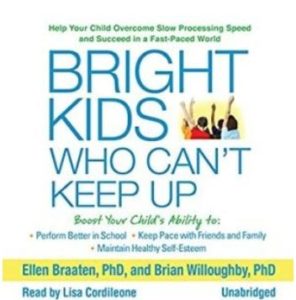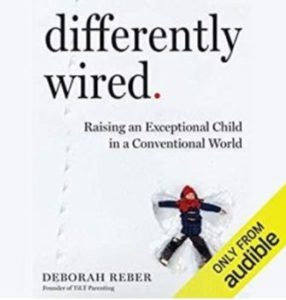Audiobooks for Parents on Processing Speed
Kids who have difficulty with processing speed often require extra time or support on tasks and activities. They may take a little bit longer to understand what is being asked of them or to complete even simple tasks. Being timely and efficient can become even more difficult when it comes to doing homework or getting ready to go to school in the morning. Parents of these children can feel run down and exhausted with the extra attention it takes to help them complete their work and chores. Fortunately, there are many helpful books to help and understand your kids, and by listening to audiobooks, you wouldn’t require extra time to learn these strategies. You could listen in the car, while working out, or when cooking dinner, the possibilities are endless. It’s a great way to learn more about kids who have problems with processing speed and the most effective parenting strategies to help these children succeed.
Our team of neuropsychologists, school psychologists, and psychology students at South County Child and Family Consultants are committed to searching the Internet and beyond to find reputable, informative, and practical tools to help parents, children, and teens. We look for the best information online to help kids diagnosed with ADHD, Learning Disabilities, executive-functioning difficulties, struggles with Social Emotional Learning (SEL) skills, autism, depression, and anxiety, among others, and provide you with information about how neuropsychological evaluations can help in targeting these concerns. Come back regularly, as the links are updated frequently with the most up-to-date resources available.

Bright Kids Who Can’t Keep Up: Help Your Child Overcome Slow Processing Speed and Succeed in a Fast-Paced World by Ellen Braaten, Ph.D. and Brian Willoughby, Ph.D.
Do you find yourself constantly asking your child to “pick up the pace”? Does he or she seem to take longer than others to get stuff done – whether completing homework, responding when spoken to, or getting dressed and ready in the morning? Filled with vivid stories and examples, this crucial resource demystifies processing speed and shows how to help kids (ages five to 18) catch up in this key area of development. (From Amazon.com audiobook review)
Dr. Kulman’s take: The single best book on processing-speed issues in kids to help parents and educators understand these children and make accommodations that help.
 The Smart but Scattered Guide to Success: How to Use Your Brain’s Executive Skills to Keep Up, Stay Calm, and Get Organized at Work and at Home by Peg Dawson, Ed.D. and Richard Guare, Ph.D.
The Smart but Scattered Guide to Success: How to Use Your Brain’s Executive Skills to Keep Up, Stay Calm, and Get Organized at Work and at Home by Peg Dawson, Ed.D. and Richard Guare, Ph.D.
Are you smart, scattered, and struggling? You’re not alone. Cutting-edge research shows that today’s 24/7 wired world and the growing demands of work and family life may simply max out the part of the brain that manages complex tasks. That’s especially true for those lacking strong executive skills – the core brain-based abilities needed to maintain focus, meet deadlines and stay cool under pressure. (From Amazon.com audiobook review)
Dr. Kulman’s take: One of the notable series on executive functions by Peg Dawson and Richard Guare. While not specifically about slow processing, it includes many helpful ideas on time management, task initiation, and task persistence that all play a role in slow processors.
 Differently Wired: Raising an Exceptional Child in a Conventional World by Deborah Reber
Differently Wired: Raising an Exceptional Child in a Conventional World by Deborah Reber
Today millions of kids are stuck in a world that doesn’t respect, support, or embrace who they really are – these are what Deborah Reber is calling the “differently wired” kids, the one in five children with ADHD, dyslexia, Asperger’s, giftedness, anxiety, sensory processing disorder, and other neurodifferences. Their challenges are many. But for the parents who love them, the challenges are just as hard – struggling to find the right school, the right therapist, the right parenting group while feeling isolated and harboring endless internal doubts about what’s normal, what’s not, and how to handle it all. (From Amazon.com audiobook review)
Dr. Kulman’s take: Deborah Reber talks directly to parents so they can understand their child’s differences and accept and support them. She describes the twice-exceptionality (2E) of many kids who may process information slowly.